#Paul Fussell
Text





irony can be so painful; that’s a catch-22?
track-rhetoric 🛤️👣🐾🔀🦊🇵🇸✨⚠️
#art#poetry#words#dark academia#rhetoric#light academia#web weaving#philosophy tumblr#love#language#war#wilfred owen#paul fussell#the great war and modern memory#shell shocked#freud#albert einstein#the talking cure#track 2 diplomacy#track-language & track-grammar & track-logic & track-rhetoric
7 notes
·
View notes
Text
man paul fussell is so mad at that stupid Flanders Fields poem and he is so right and can keep on saying it louder for the people in the back
#in flanders fields#tagging my hate#not actually rereading Great War and Modern Memory but conversation at dinner sort of worked its way around here via monkey's paws#wwi#paul fussell
7 notes
·
View notes
Text
The Table of Equivalents
In his seminal work, The Great War and Modern Memory, Paul Fussell exaplains:
The language is that which two generations of readers had been accustomed to associate with the quiet action of personal control and Christian self-abnegation ("sacrifice"), as well as With more violent actions of aggression and defense. The tutors in this special diction had been the boys' books of George Alfred Henty; the male-romances of Rider, Haggard; the poems of Robert Bridges; and especially the Arthurian poems of Tennyson and the pseudo-medieval romances of William Morris. We can set out this "raised," essentially feudal language in a table of equivalents:

This system of "high" diction was not the least of the ultimate casualties of the war. But its staying power astonishing. As late as 1918 it was still possible for some men who had actually fought to sustain the old rhetoric.
2 notes
·
View notes
Text
'The logical reason that Christopher Nolan’s new movie Oppenheimer does not depict the bombings of Hiroshima and Nagasaki that were the fruit of title character J. Robert Oppenheimer’s secret operations at Los Alamos and elsewhere is that the movie sticks hard to its title character. A man who heard about the bombings on the radio just like everybody else in the United States did. Nolan’s movie gives the viewer the world through Oppenheimer’s eyes — while the movie does depart from the character’s perspective to move its frame story forward, it’s never directly about anything but the man and, more importantly, what he did.
For some this puts the movie at a disadvantage…but in terms of what? In terms of spectacle? If any filmmaker could get financing and summon the technical wherewithal to actually depict fiery carnage on a scale of Hiroshima’s, it’s certainly Nolan. And while the filmmaker himself hasn’t cited moral or ethical concerns when discussing his withholding of these sights from his movie, such issues are summoned and given a thorough albeit indirect airing out in two films by the French director Alain Resnais.
The first, and most obvious, is, well, Hiroshima, Mon Amour, Resnais’s first feature, directed after he made a decade’s worth of innovative non-fiction short films. The 1959 fiction film was written by Marguerite Duras, the groundbreaking French writer whose experimental fictions were rife with philosophical and intellectual challenges. The subject of Hiroshima, Mon Amour is of trauma, historical and personal.
The movie, in black and white and Academy aspect ratio, opens with a negative image of a plant growing, perhaps, as we’ll infer later, a mutated, irradiated one. Then we see naked limbs and flanks, components of a couple in embrace. Sand pours on to their bodies. Soon it starts to glow; is it sand, or a form or radioactive dust. A man’s voice says “You saw nothing in Hiroshima. Nothing.” 'A woman’s voice insists that she has seen Hiroshima. She’s been to its hospital: “The hospital in Hiroshima exists. How could I not have seen it?”
She describes, and the camera echoes with physical evidence, what she’s seen: The Hiroshima museum, with its “bouquets of bottle caps” — objects fused together in the nuclear fire of the explosion — and the hair that fell out of the heads of those who weren’t killed in the vicinity that day, and the photos of actual burn victims. But the man insists: you saw nothing. She says “The reconstructions were as authentic as possible. The films were as authentic as possible.” And again, Resnais shows simulations of the survivors of the blast (a couple of briskly moving tracking shots of fake burn victims), and then puts in actual documentary footage of people with missing eyes, twisted limbs, and more.
“As authentic as possible?” Exactly. What, in these circumstances, does authentic even mean? To what extent does the information we are being given correspond to the reality of what happened? Hiroshima, mon amour strongly suggests that such films, however “accurate” or “authentic” (two entirely different categories of course), have nothing really to do with direct experience of trauma. And that such documents are perhaps the akin to the graven images that Mosaic law prohibits, in that there is the possibility that we might elevate them in a vain attempt to transcend or ameliorate trauma.
“The illusion is so perfect that tourists weep. What else can tourists do,” the woman says near the end of an over ten-minute sequence on the question. “What else was there to weep over,” the man asks, and eventually the movie tells us. The woman (Emmanuelle Riva) is French, the man (Eiji Okada) is Japanese, and neither is named in the film. Not naming your characters was a thing in arty postmodern literature and film at this time (the same thing happens in Resnais’ next film, Last Year At Marienbad, another study of reality, memory, and what can be known, albeit a much more abstracted treatment), but here it’s crucial to the movie’s final point, delivered in its last lines. In any event, their love story began with a bar pickup in a post-war Hiroshima, where she, an actress, is playing a nurse in a fictional movie about the bombing’s aftermath. “It’s about peace,” she shrugs when the man meets her on the set. “Here in Hiroshima we don’t make fun of films about peace,” he says. A few extras pass them, carrying signs bearing enlarged photos of burn victims. The couple is obscured but are laughing when they’re revealed again.
This feels insane — how can we behave as we do, with images of such suffering being paraded before us? In part it’s because those images cannot make us know suffering.
The movie’s larger question outside its historical context has to do with the possibility of love, and what love can achieve for both individuals and humankind, if anything at all. While it may seem so at first, the movie doesn’t abandon Hiroshima to tell the story of the female character and her own personal World War II trauma; it tells that story to demonstrate what she carries, and to demonstrate that what we all carry is inextricably tied up with our ability to empathize, as far as it goes, and the film insists that it can only go so far.
Throughout the film, we distinguish between recreations, acted drama, and footage of real events, and unconsciously assess the weight of each form as we’re also processing the narrative of the love story.
“The whole world rejoiced. And you rejoiced with it,” the man says to the woman about the bombings that did, after all, put an end to World War II. This was the world’s shame, and not just the West’s shame — do you think that China and Korea were sorry to see Japan’s days as a military power come to an end? The scholar and historian Paul Fussell shocked America’s more guilt-ridden intellectuals with his early ‘80s essay “Thank God for the Atom Bomb.” From the point of view of a U.S. soldier who was spared having to fight in the Pacific Theater, the atrocity was indeed a godsend. (Believe it or not, the British blues rock band The Groundhogs actually beat Fussell to articulating that sentiment with its song “Thank Christ For The Bomb,” from the 1970 album of the same name.)
To see suffering on the Hiroshima scale meticulously recreated through performance and special effects — would this help us, decades on, to resolve any of these contradictions? The answer to the question, according to Duras and Resnais, is that had Nolan chosen to somehow “recreate” the bombing of Hiroshima, we, the viewers, would really see nothing. I think they’re right. In any event, Oppenheimer finally is about something altogether different: the reality that men of science, completely rational beings supposedly, have enabled mankind’s potential instantaneous extinction. This is indeed unprecedented.
If we want to continue to think about the ethics of re-creation and depiction, though, It’s useful to think about it relative to another 20th century calamity. If the bombings of Hiroshima and Nagasaki, while taking a staggering number of human lives, demonstrated the cataclysmic — indeed, apocalyptic — potential of nuclear weapons, the Holocaust, with its six million dead, demonstrated that the horror of man’s inhumanity to man is alas inexhaustible. In 1956, Resnais made Night and Fog, one of the first and most important Holocaust documentaries. The 32-minute film begins with color footage of death camps as they were 10 years or so after liberation — empty, overgrown with grass, still. Resnais’ camera dollies down a railroad track, following the path the trains packed with Jews marked for extermination did. Narrator Michel Bouquet says (the script is by Jean Cayrol, a poet): “we move slowly along…looking for what? Traces of corpses that fell out when the doors opened? Or of those herded at gunpoint to the camp’s gates amid barking dogs and glaring searchlights, the crematorium’s flames in the distance” — and here the camera gets to the very end of the tracks — “in a nocturnal spectacle the Nazis were so fond of.”
While the film uses horrific archival material, it also insists that in revealing the camps as they stand at the time of filming, “we can only show you the outer shell.” As, for instance, the fingernail scratches on the ceilings of the crematoria. The narration pauses to let the viewer consider how these came to be. The Nazis destroyed as much documentation on the death camps as they could once the war was lost and the Allies were on their way (and much documentation had been trashed even prior to that), but Night and Fog is also asking “How much do you need to see, anyway?” Because memory will recede. The gods of war are only pretending to be asleep. Looking at such images and relegating them to the past yields a comfort that is ultimately false. “We pretend to regain hope as the image recedes, as though we’ve been cured of that plague,” the narration states near the movie’s end. Resnais’ approach helps us understand why Claude Lanzmann included zero archival footage in his astonishing Holocaust film Shoah.
As for fictional treatments of the Holocaust, the genie of depiction got out of the bottle quite some time ago. For many, to orchestrate a simulation of such atrocities is itself an obscenity, although good luck convincing a Life Is Beautiful fan of this. Writing about Night and Fog in his 1995 book Flickers, the novelist and critic Gilbert Adair also turned his attention to Steven Spielberg’s 1993 Schindler’s List, and after saying the picture was “not at all the disgrace that one had every right to expect,” he nevertheless deemed it “a monstrosity.” After which he grimly mused on the performative recreation of death camp horrors: “[W]hat I see when I watch the film, what, hard as I try, I cannot prevent myself from seeing, is that cast being put through its paces on some foggy, nocturnal location, put through its paces by the boyishly handsome director himself in his snazzy windcheater, his red N.Y. Yankees baseball cap, his granny glasses and his beard. I see him blowing into his cupped hands and pointing a gloved finger as directors do. I see the bony, skeletal extras, in striped pajamas or else stark naked, laughing and joking and jostling one another (why not? It’s their right) while waiting for a new shot to be set up. I see the makeup artists…” and so on. Let us not allow Adair’s feverish projection (Spielberg doesn’t wear Yankees caps, for one thing) obscure his larger point: Some things, finally, just should not be acted out.
Did this notion inform Nolan’s decision? Maybe not as much as we’d like to think, given that the dramatic structure of the film doesn’t allow for an easy departure across the world to begin with. But in the end, incineration by nuclear blast is depicted as Oppenheimer’s nightmare vision of just one person. A Los Alamos worker played by Nolan’s own daughter, Flora. Who is a film student of college age, so chill.'
#Oppenheimer#Christopher Nolan#Los Alamos#Alain Resnais#Hiroshima#Marguerite Duras#Paul Fussell#“Thank God for the Atom Bomb”#Night and Fog#Shoah#Claude Lanzmann#Flickers#Steven Spielberg#Gilbert Adair#Schindler's List
4 notes
·
View notes
Text
"I would simply Do The Right Thing in every occasion, no matter what the law says" is awfully tempting. As is "People who Do Bad Things, regardless of the circumstances, should be condemned forever."
Yes, this is partly a response to that one post that literally Godwined Kamala Harris ("she couldn't overturn a law on her own or act like the law didn't apply" "Oh, she was 'only following orders', huh? ACAB! ACAB!"), but it's also a response to the atom bomb Discourse that crops up around this time every year.
"The past, which as always did not know the future, acted in ways that ask to be imagined before they are condemned. Or even simplified."
--Paul Fussell
0 notes
Text

— Paul Fussell, Poetic Meter and Poetic Form, 1979 Edition
0 notes
Text

Paul Fussell's book "Class" is my all-time favorite and I gave it to my dad and he loved it. We used to quote it and laugh. When he passed, I donated a memorial copy to my library in my dad's name. Fussle says, 'the extremes of poverty and wealth are predictable, but it’s the middle class where the decorative shenanigans shine, powered by a belief one is a step or two above one’s actual station.'
160 notes
·
View notes
Text
I'm reading a book on ww i for class, and I've rarely seen a put down so elegantly engineered in my life

1 note
·
View note
Text
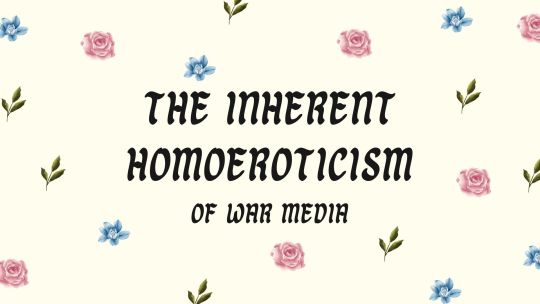

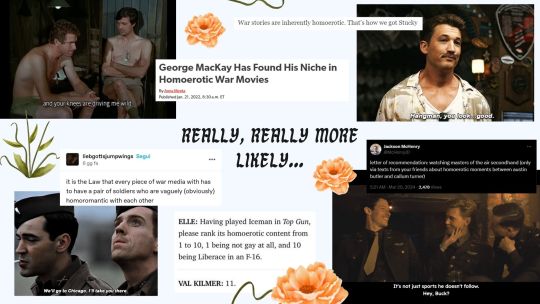
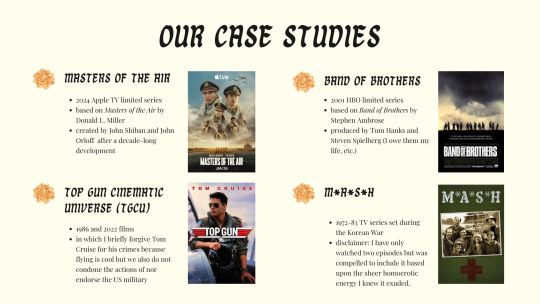

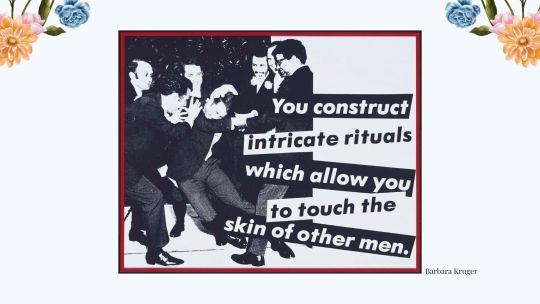
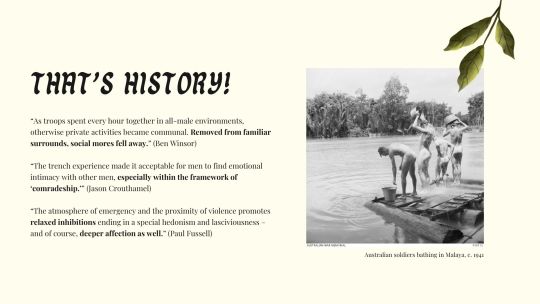
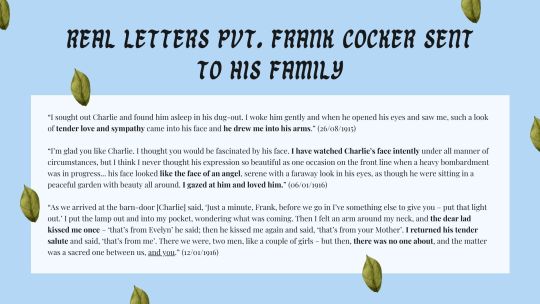


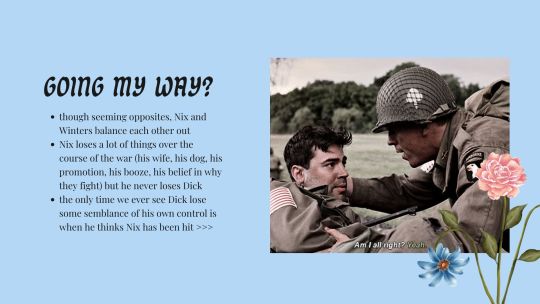
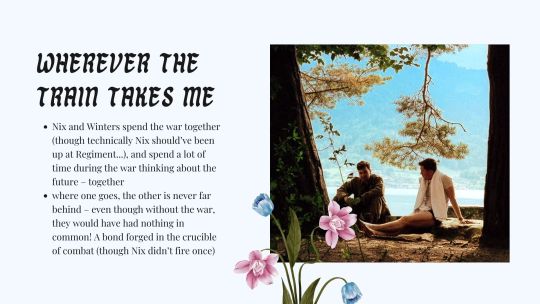
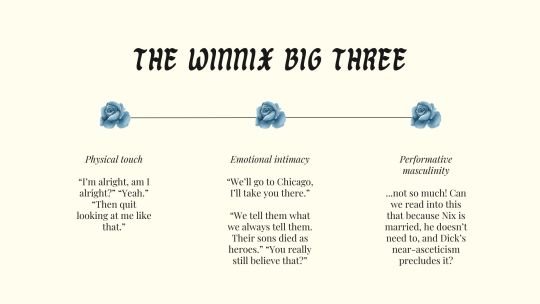
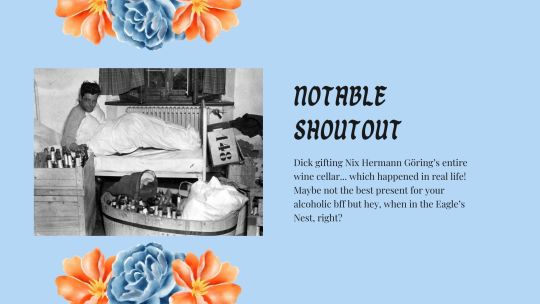
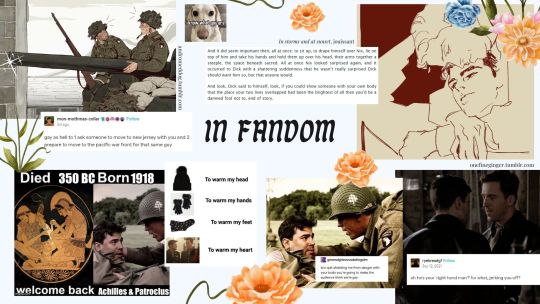





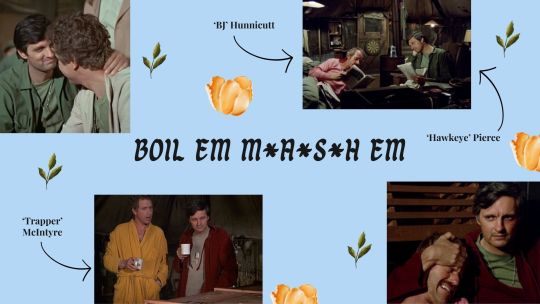
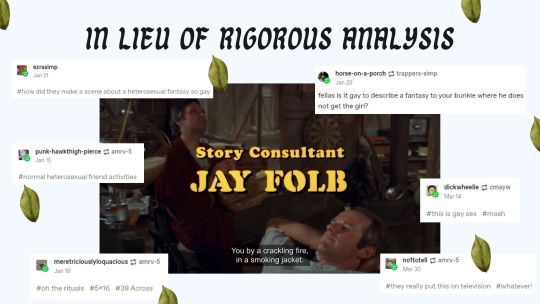

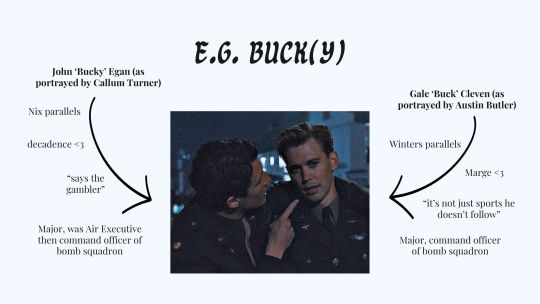
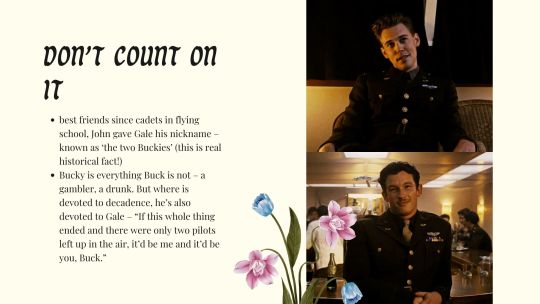
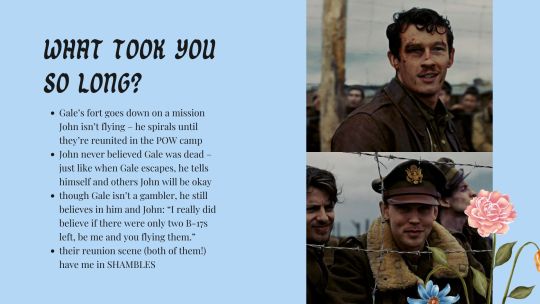


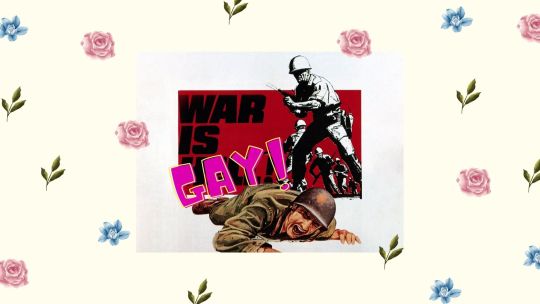
the inherent homoeroticism of war media: a completely unserious presentation by me
[note: some slides have been removed because they're literally just fancams and also i had more than 30 slides boo tumblr image limits]
BIBLIOGRAPHY (just going in order of slides)
and your knees are driving me wild - mash s02e08
george mackay has found his niche in homoerotic war movies
war stories are inherently homoerotic. that's how we got stucky
hangman you look good - top gun: maverick (gif by babyrooster)
letter of recommendation: watching masters of the air secondhand
it's not just sports - masters of the air e02
1 being not gay at all, 10 being liberace in an f-16
we'll go to chicago - band of brothers e01 (gif by @fkmylif3)
it is the law that every piece of war media
kim is a homoseggsual - kath & kim s01e02
Untitled (You Construct Intricate Rituals) - Barbara Kruger
The Secret History of Australia's Gay Diggers - Ben Winsor (+ Paul Fussell quoted within)
Sexuality, Sexual Relations and Homosexuality - Jason Crouthamel
Soldiers bathing in Malaya - AWM
Private Frank Crocker letters featured in Sebastian Faulks and Hope Wolf, A Broken World: Letters, Diaries and Memories of the Great War (2014), pp. 75-78.
mike's mic screencap my beloved <3
winnix gifs by @bandofbrothers2001 @preacherboyd @galebucky
winnix art by @andromeddog
winnix art by @onefineginger
In storms and at sunset by jouissant
winnix memes/text posts: 1 (@bleedingcoffee42) 2 (@krakerjaksstuff) 3 (@claudycod) 4 (@lewis-winters) 5 (@mon-mothmas-collar)
man is a hopeless creature i don't like much of anyone (@sluttyhenley)
You Create Intricate Rituals: The Homoerotic Action Movie - Rebecca Radillo (Lyvie Scott featured)
val kilmer icemav warrior compliation by @mavernick2
t as in top gun: maverick (@misaothewitch)
which is gayer (@holypowell)
we're fools to make war by whimsicule
all my roads lead back to you by liadan14
m*a*s*h video by @amrv-5 (+ reblog tags)
clegan/buck(y) gifs by @4o4notf0und @rcbertleckie
clegan fanart by @ifapromise <3
clegan memes: 1 (@rcbertleckie) 2 (@season-two) 3 (@ww2yaoi) 4 & 5
bomber's moon by moonrocks
**i tried to tag/link everything, if anything is broken or unsourced please let me know and i will endeavour to fix it! standard disclaimer that a) any discussion about war media based on real life people is based upon the fictional portrayals of those people and not the actual dudes. and b) this powerpoint was made for fun, it is not rigorous academic analysis. all opinions expressed are my own. please do not take it too seriously! that's all <3
#hbo war#hbowaredit#band of brothers#bobedit#masters of the air#mota#motaedit#top gun#top gun maverick#mash#m*a*s*h#clegan#winnix#hangster#icemav#liz makes things#web weaving#maybe?? idk!#GOD OK BE FREE GO INTO THE WORLD <3#edit i have since seen like 10 mash episodes but i'm not redoing this.#edit edit i just realised i have a citation for a mikes mic screencap that is not here bc its on a deleted slide oopsie
2K notes
·
View notes
Note
Hey, apologies, I'm sure this has been asked before & I've seen an answer about it, but I'm struggling to find the post! And absolutely no pressure to answer bc I know it's asking a lot. I really enjoy reading poetry and find your poetry so wonderful & moving to read, I really treasure my copy of wonderers & witch talkers. I have no background in literature or humanities and I really enjoy writing poetry but it is Bad Poetry. Is there a way to get better at both reading & writing poetry, please?
thank you so much, that's so flattering! 🥰♥
there's a lot of advice about writing poetry in my tagged/writing:
my process of writing a poem from beginning to end, including editing
how to get over the anxiety of being "bad" at poetry
how to find your poetic voice (via @christee-angel)
writing exercises
on line breaks in free-form poetry
how to get started writing fixed-form poetry
sonnet exercises (at the end of this reading). mostly if you've already written a few sonnets and are interested in the form
how to avoid sounding trite (don't worry about this yet if you've just started writing poetry)
the advice in there about reading poetry is sparser, but a lot of the advice about writing (making sure that things like tone, line breaks, and meter are 'doing' what you want them to do) doubles as advice about reading—in fact, reading poetry is necessary to gain an understanding of what, for example, a line break 'does' to your experience of reading a poem, such that you can manipulate your own line breaks to effect.
more advice on reading poetry:
Paul Fussell's Poetic Meter and Poetic Form is often given as an intro to close reading of poetry. you might start with chapter 6, which engages with both metre and rhyme.
different ethos of reading literature (that aren't close reading) and questions to ask yourself as you read
how to read stress in / perform scansion of metred poetry
I also want to stress that, if you're enjoying what you read, you are not "bad" at reading poetry. reading a poem, having an emotional (or other) response to the import of the words, a pleasurable (or jarring, thought-provoking, interestingly uncomfortable) response to the texture of the language itself—any instance where a poem is 'doing' something for you, where you feel like you're getting something from the poem, or collaborating with the poem to produce an experience you like—these are all 'successful' instances of reading poetry.
additional things to do / pay attention to when reading a poem:
read the poem silently, and then (if you can) aloud. pay attention to how the poem makes you feel, what situation you think it's describing, what ideas you get from it. then listen to the poem as it's read (if there's a reading on youtube or an audiobook version, for example) and compare that to your reading of the poem. how do the different readings suggest different interpretations or emphasis?
on your next reading, pay special attention to the language of the poem and to how the words sound put together as you read aloud. how do they feel in your mouth? what rhymes, repeated sounds (consonance or assonance), rhythms do you notice? at what pace do move across the page, and how does the author of the poem use rhythm, lineation, or spacing across the page to alter that pace? can you liken the rhythm of the poem to a certain pattern of bodily movement? can you 'feel' it? what does the shape of the poem evoke? why do you think the author made the choices they did?
notice the tone of the words chosen. is it matter-of-fact, melodramatic, incisive, flowery, pared-down, effusive?
notice the structure of the poem. is it strictly chronological, does it move back and forth, is it wandering, repetitive, cyclic, does it repeatedly reference ideas or repeat images that have come before? what effect do these things have on your experience of the poem? how would the poem be different with a different tone or structure?
as a writing exercise, try writing the poem with a different tone or structure. what changes? is it more effective, less effective, does it do different things? which version do you prefer?
does the poem remind you of anything you've read before? what ideas in the broader world (social, literary, economic, political) does the poem reference or play with? does your perception of the poem's form (i.e., you probably have different ideas about what a sonnet versus a free-form poem 'means') seem to work with or against the poem's tone and ideas? why do you think the poet chose the form they did? on analysing the choices that a poet made within a fixed form, see Fussell again.
as you notice different aspects of a poem in their plurality, you should be in a better place to manipulate these things in your own writing; this also encourages more multivalent possibilities in how you respond to other people's writing.
161 notes
·
View notes
Text
my best autistic trait is the connections i am able to make BY the way. everything i have ever loved is related but only if you have my beautiful mind. did you know paul fussell who wrote the great war and modern memory, a book i consider sort of an authority on cultural conceptions of wwi, also wrote an essay in 1981 called ‘thank god for the atom bomb’ which is, in his way, an incredibly 1960s influenced publication. and i disagree with him about most of it, but it’s my interesting fact of the day.
8 notes
·
View notes
Note
happy birthday jess! i hope you have an amazing day with all the people you love :) in the meantime, what made you come up with the main concept for "every beautiful thing"? there aren't many post-war bob fics, which makes your fic really interesting!
also, do you have any good non-fiction ww1 book recs? (if not that's fine, i'm just curious)
Hi Blu! Thanks so much for the birthday wishes. I rewatched BoB th past summer for the first time in more than a decade. I was drawn to Chuck from the first episode on, I think, because I knew how it ended for him. I started doing some basic research on his life after the war, and I couldn't find much. When I thought about writing a BoB fic, giving Chuck a happy ending, or at least some kind of resolution appealed to me. I knew with his kind of inury, recovery would take a long time. Then i read this fic and it gave me a jumping-off point. I think setting the fic post-war gives me a lot of freedom. I don't have to worry about canon or as many historical details (although I still find myself looking up all kinds of facts when I'm writing).
Learning more about WWI is on my reading/history to-do list. While I know the major elements, for what is arguably the defining event of the 20th century, most Americans don't know as much as we should, probably because we were only in the war for less than a year. One book I read in college was Paul Fussell's The Great War and Modern Memory. While it's more literary cricticsm than history, it discusses how the culture was changed by Great War literature. A fantastic book, especially if you are familiar with the WWI poets.
BIrthday Ask Me Anything
7 notes
·
View notes
Text

Radio Free Aquarium Drunkard :: Linda Thompson Special
Y'all, I'll be back on the Dublab airwaves this Sunday 4-6pm PST for another installment of Radio Free Aquarium Drunkard, which Chad DePasquale and I put together every dang month. I am unclear who listens to this thing (hey I'm unclear who reads D&GFTT, now that you mention it), but I enjoy doing it, getting some sounds out there for anyone who needs/wants it.
This month, as a follow-up to my recent interview with her, I've made a mix of Linda Thompson deep cuts/rarities/favorites that stretches from the late 1960s to the singer's new one, Proxy Music. There's plenty of Richard Thompson in there, but also Bert Jansch, Sandy Denny and even Elton freaking John. A good listen — it'll be archived via Dublab a few days after it airs, but what the heck, it's more fun to tune in as it happens, right? (Semi-related: I encourage you to check out my infamous brother's ongoing Sandy Saturdays series, which is only rarely published on Saturdays.)
Radio Free Aquarium Drunkard is free to all; Aquarium Drunkard, as of this spring, is a member-based website these days. I'm biased of course, but AD is better than ever in 2024 — just this week we've published my Danny Paul Grody interview, a Jake Xerxes Fussell Q&A, an insightful appreciation of Herbie Hancock's Fat Albert Rotunda and a look at Anne Phillips' hidden gem of jazz noir, Born To Be Blue. And more!
5 notes
·
View notes
Text
2023 Book Reviews
Ok, let's see if Tumblr lets me post this (I think it shouldn't be too long?) -- it's all my book reviews from 2023! Entirely unedited and just copy-pasted in, but on the off chance anyone else is interested in it, here it is.
I finished Tolkien and the Great War which was like…¾ very good. The last quarter was a fairly inexplicable and incredibly boring discursion on the early versions of what would, essentially, become the Silmarillion. Although a lot of his early works and early conceptions of what the Middle Earth mythology would be do tie into his life and experiences as a very young man in a hellish situation, this was just like…a recitation. And it was followed by a brilliant analysis of why Tolkien turned to an older medieval storytelling form instead of the modernists that we think of when it comes to the usual WWI writing! It was so good! The good parts of this books are so good! I simply cannot bring myself to care about the phoneme shifts his languages undergo.
It did remind me that I want to return to Paul Fussell’s writing in 2024, so there is that?
Also Tolkien’s bitchy disapproval of the aesthetes is never not hilarious to me.
I finished Hogfather, about which I refuse to give any kind of review other than to say I’ve been reading it nearly every December for going on 23 years now, and it’s a perfect book and I love it.
I finished Congratulations, the Best is Over! and I feel some kinda way about it. I love R. Eric Thomas, but the longer-form essays are sometimes good and sometimes not so good? I didn’t dislike it at all, but I’m also looking forward to what he writes next, as I think every collection gets a little bit better.
I finished The Custom of the Country and oh my god I LOVED IT. The Age of Innocence is still my favorite Wharton because Ellen Olenska, but this was the book that made me scream the most. It’s funny in the way that reality TV is funny, in that you laugh because you are horrified. Undine Spragg is the most magnfiicent monster in literature. She’s horrible. I adore her. What a fabulous work of art/car crash this book is.
I finished the latest Perveen Mistry Mystery, The Mistress of Bhatia House and it was wonderful but oh my god it is STRESSFUL and kind of a hard read at times because everyone is just being a huge dick to each other.
(Also there’s a pretty major plot point left totally un-tied-up at the end which is wild, but I guess it’ll get sorted next book?)
I finished Lolly Willowes which tbh I didn’t love as much as I hoped I would, but is a very excellent book with some mind-blowingly relatable bits and I enjoyed it immensely. I love Sylvia Townsend Warner but just need to go in without expectations and enjoy the rather lengthy ride. (For such a short book, it takes awhile for anything to happen.)
I read Dolls of Our Lives and the more I think about it the more I disliked it. I’m tired and lazy so here’s the review I sent a friend:
I finished Dolls of our Lives last night. I found it…okay. The editing is often bad which was depressing. It mostly felt really tonally inconsistent – they’re both historians and know their stuff, but keep putting in schticky little pop culture jokes that are a) not that funny? and b) just appear out of nowhere. If you’re going to look at AG through a pop culture lens, do it properly, don’t just randomly name-drop pop culture stuff. It occasionally dips below surface-level analysis, but it’s not super memorable and I don’t see it aging really well. (I’d LOVE someone to write an accessible book that actually does look at AG dolls both within their own cultural contexts and the context of when they were released, to say nothing of the interplay of doll + book, and maybe with an added chapter on how girls and dolls play, and what it meant to release a doll that wasn’t aspirational in some way, whether it be an adult like Barbie or a baby doll. Okay, maybe I want three books. But it feels like there’s a lot of richness to dig into, and I’ve yet to see anyone scrape more than the surface.) Anyway, 6/10, it was okay but the authors do themselves a disservice. There’s a small section at the end where they talk about themselves and how the podcast has changed them and how it came about and it’s the best bit of the book because it’s actually vulnerable and interesting, with some theory thrown in, and it’s barely shticky at all.
I will now add that I think it’ll age like milk, and I’m super disappointed.
In happier news, I read The Murder of Roger Ackroyd which is simply a masterpiece, and reading it was a deep and abiding pleasure. I know the twist and it still worked wonderfully on me – if you don’t know how it ends, I REALLY urge you not to spoil yourself and also to read it, for it’s wonderful and you will scream at the reveal.
I finished When the Angels Left the Old Country after @lesbrarian recommended it and it might be my favorite book I’ve read this year? Top five, certainly – it’s tense and beautiful and funny and full of love and very Jewish, and it just filled me with joy to read, even the sad parts. The comparisons to Good Omens are unavoidable, but really I find it a very different story in a lot of ways, although certainly with connections. I adored it, and it’s one of those books I can’t wait to re-read. Also every time I think about the angel too much I want to cry, but in a good way.
I also – finally, after many breaks – finished The Path the Power, the first volume of Caro’s LBJ biography. Oh my god, this book. THIS BOOK. The next time I do this I’m going to update every week on what I learned that week because there is just so much in this tome. I want to visit the Pedernales, but not in summer. The description of grass-growing was riveting. The descriptions of the lives of the farmwives before electrification was riveting (and horrific). The play-by-play for elections in the forties literally kept me up past my bedtime. And I have not even touched on Pappy O'Daniel (a real person!! who was apparently toned down CONSIDERABLY for O Brother Where Art Thou) or Lady Bird or how Caro more than once makes sure to mention that Johnson had a dumptruck ass.
Anyway, Lyndon was a vote-buying absolute fucking weirdo from birth and his mother was just as weird and his father was fascinating and I’m a little in love with Sam Rayburn. Do not let either the Old White Man History or the fact that this book is a fucking doorstop stop you, this is a masterpiece and I see why it won a Pulitzer. (whoops, looks like it was another volume that won the Pulitzer) I cannot wait to read the other volumes, which I estimate will take me about a year per book, but worth it!
I finished Menewood, about which I cannot possibly write intelligently. Hild was and is so important to me and I love that period in English history so, so much, and the immersiveness of the books, how heartbreaking and hard and wild and wonderful they are!
It did push me to plan to get Hild in non-ebook format; they’re both absolute bricks so it’s easier to read the e-book but I found it super helpful to be able to easily refer to the family trees and maps and stuff.
I finished Lauren Groff’s The Vaster Wilds and as a certified Groff stan I loved it. It’s gross and hard and has the most amazing end, and like Matrix I am excited to re-read it over and over and unlock more language and more beauty and just more.
I finished Here for It by R. Eric Thomas and loved it. It’s more serious and longer-form than what he writes for his newletter or Elle, and really benefits from it; he’s an incredibly talented storyteller. Not what I was expecting, but all the better for it.
I am DNF for A Lady for a Duke which I had such high hopes for! I don’t think it’s a bad book, but it is not a book for me, unfortunately.
I finished Everything I Need I Get from You: How Fangirls Created the Internet as We Know It and have a lot of feelings! I think it’s a really, really good book that’s respectful of fans and interesting, but it focuses almost solely on One Direction fandom, and I kind of wish that was clearer from the title and the summary? Like, no shade to that being the topic, but it feels like this is being sold as kind of a universal look at online fandom, and…it kinda isn’t?
(yes i’m salty there wasn’t anything about snapewives, yes this was somewhat soothed by chapters dedicated to L*rr*es and B*byg*te, YES I am afraid of 1D fangirls.)
I also read Phoebe’s Diary because I adore Phoebe Wahl and it was cool to read a middle-grade novel/graphic novel from her! (Most of the book is typeset, but there are lots of great little cartoons and drawings interspersed. I really, really liked it, although sometimes it’s a little hard to read because a) it is very realistic which means it’s like 95% about boys and boyfriends and that gets kind of old and b) it is very realistic and made me so unbelievably grateful that I never ever have to be 16 again. I would be extremely curious what a contemporary sixteen-year-old thought because it’s kind of a semi-period piece (set in 2005-6) and a few bits of it sort of…haven’t aged well from that period? (There’s one character who I think we’re meant to dislike but I love her so much because she reads aro-ace.) Anyway, I’m really glad I read it although at times it was painful, 10/10 do not miss being sixteen.
I haven’t finished anything, but I’m DNF for Sarah Vowell’s Lafayette in the Somewhat United States because I found it hard to follow and frankly incredibly boring. (I am going hard for the DNF’s these days, life is too short.)
omg so much! I read Learned by Heart in like three days, and it made my Anne Lister-loving heart sing. Truly, it broke my heart and it was so sweet and so happy and sad and just so good, I loved it and I’m hoping it triggers another bout of Lister hyperfixation.
I also read Agatha of Little Neon, which was likewise sad but sweet and happy and hopeful. It had a lot of feelings, but I loved it very, very much, and it just…made me feel good inside?
I was DNF on The Late Americans by about the sixth Sad Gay Man whose personality traits were that he was Sad and Gay and [insert one additional trait here that is shared with at least one other Sad Gay Man]. I love Brandon’s newsletter and his criticism; I did not like this novel.
I FINALLY finished Herzog! For a relatively short novel, it benefits from a slow reading – and I even basically skipped over the philosophical bits because my love for sad mid-century white men only goes so far. Anyway – a little to my surprise, I enormously enjoyed it. I don’t know that it’s, like, the greatest novel ever written and it’s edging into my ‘This got a Pulitzer? Really?’ pile, but a) I can see why it was groundbreaking and amazing and the Saga of the Everyman when it came out and b) honestly it’s really funny and interesting. It’s a little bit Odyssey-like, and Herzog is such a likeable schmuck, and just, yeah. It was great. It’s also a wonderful love letter to both the Berkshires and Chicago, and I loved the very quick Vineyard Havens moment.
Our Wives Under the Sea – a friend said this was the best book she’d read all summer, and I think it’s up there for me. It’s haunting and weird and beautiful and sad and I loved it very much.
Painted Pomegranates and Needlepoint Rabbis: How Jews Craft Resilience and Create Community - hah, I just realized this was a gift from the friend who made the Our Wives rec! I’ve got a little theme of reading about how craft creates meaning in various communities/subcommunities, and this fits right in. It’s definitely an academic text, but I found it extremely accessible. It doesn’t present a very diverse portrait of Judaism – which the author absolutely admits to and apologizes for – but for what it is, it’s a very interesting and valuable text, and I’m glad I read it and it’s part of my collection now.
I finished Big Swiss which is one of those books I ought to hate, but I was…not necessarily loving it, but definitely fascinated as hell with it. It’s such a gross book, and Greta is so majestically self-destructive, I actually could not look away. Magnificent, 10/10 would watch barely-likeable protagonists fuck their own lives up again.
Also, not a book, but I finally read Blackmun’s dissent in DeShaney v. Winnebago County, a landmark case that essentially determined that the government is not actually expected to protect you. (Skip noted segregationist Chief Justice William Rehnquist’s ruling, but the Wikipedia article on the case breaks it down well.) You can read it here – scroll down to the very bottom, his dissent is only 4 paragraphs, and it is beautifully, wonderfully written. The ‘Poor Joshua!’ paragraph is the most famous, but I return again and again to the passage Justice Blackmun quotes from Stone’s Law, Psychiatry and Morality, and particularly the line “What is required of us is moral ambition.”
(I learned about the case and Blackmun’s dissent through the podcast 5-4, which is both excellent, and a good antidote to growing up in the shadow of the Warren Court, as I did. The Supreme Court has always sucked, it turns out. Seriously, it’s one of my favorite Supreme Court podcasts and I subscribe to, um, a lot.)
I read Brutes in about two sittings, it was so good. What a wonderful book about the horror of being a teenage girl, and I mean that in the best possible way. I loved it.
I finished, appropriately enough, Ned Boulting’s 1923 which is a beautiful book about the Tour de France and the nearly-forgotten Theo Beeckmann, and about the covid pandemic and history and tracking people and places down through time. I am an enormous fan of Ned (and David and Pete for any other Never Strays Far fans), and although this book very rarely pushes just a touch into bathos, it is mostly beautiful and wonderful and I’m glad he wrote it and I’m glad I read it.
(I finished it on June 30th, which is rather an important day in the book so I’m proud of my timing too.)
I also read A Half-Built Garden which I have a lot of very complex emotions about. I don’t know if I liked it, but I like how it made me react and think and feel and get grumpy. I’m not even sure it’s all that great, but it sure did make me think.
I finished Fintan O’Toole’s massive We Don’t Know Ourselves about Ireland in the last 50-odd years. It is very good, and sometimes very hard to read (he pulls no punches regarding either the IRA or the Christian Brothers) and I’m glad I read it.
I also finished Secrets Typed in Blood, the third of the Pentecost and Parker mysteries. It starts off the weakest (or maybe I was just in a Mood), but it is, as ever, a good, quick, satisfying mystery.
I read Elizabeth Kilcoyne’s Wake the Bones which I loved – I normally prefer a bit more gothic in my Southern horror, but the very end especially is the most incredible reveal. I could not stand the protagonist and I still liked the book, that’s how good it is.
I also read Scorched Grace, which is apparently first in a series about a crime-solving nun. It’s written as a hardboiled noir and, yep, that’s what it is, which means it’s also not good, but it’s supposed to be kind of hacky, so it works? It’s *gruesome*, but I liked it well enough, I think noir just really isn’t for me.
Oh, and I guess I’m on an Irish lit kick because I read Foster (more a novella than a novel), which I found pretty meh, tbh.
I keep starting new books and I’m now in the middle of at least two Giant Tomes, oops. I did finish Saltwater by Jessica Andrews which is better than the Kirkus review it got! It didn’t, like, change my life but it was good reliving being at Uni in the UK and also I enjoyed it, all I ask of a book.
The Wee Free Men by Terry Pratchett: umpteenth re-read, a perfect book. I have beautiful editions of all the Tiffany books now, and hope to slowly make my way through them.
Red Shift by Alan Garner: I was heartened to learn that this is one of his most difficult books; I will be honest that I struggled, but it’s lingered in me, and I hope to re-read it many more times and keep untangling it. It is very, very good.
Hons and Rebels by Jessica Mitford: I’ve been meaning to read this for ages, and it didn’t disappoint in the least. I’m fascinated by the Mitford sisters, and this is such a good peek into them.
It also really drives home how unutterably boring a landed-gentry upbringing was.
Trust by Hernan Diaz: ok you know how people win Oscars nominally for some meh role, but it’s clearly really for an older role that they were overlooked for? That is this book and the Pulitzer, when In the Distance probably should have won. It was fine, but I was kind of underwhelmed. Next time I’ll just read some Wharton.
DNF on Upright Women Wanted which I wanted to love very much and absolutely hated. Next time I’ll just re-read Whiskey When We’re Dry.
I did finish Murder Under Her Skin, the second of the Pentecost and Parker mysteries. It was great fun and a very good mystery and I am excited for the next one.
I finished All the Beauty in the World, the memoir of a Met Museum guard. I have an almost guilty fondness for the Met; it really should not exist, but I love it, and I loved reading this very much. I do miss easy access to world-class museums :/
I also read Michelle Tea’s Against Memoir, which has the best fucking essay of all time about the SF girl gang HAGS, but really I loved the whole thing. I’ve become an absolutely massive Michelle Tea fangirl and use her tarot book all the time and just ugh, I can’t wait to get more of her stuff.
I just finished Elie Mystal’s Allow Me to Retort: A Black Guy’s Guide to the Constitution. Mystal is incredibly funny and smart and is an amazing Twitter follow if you are still on the bird hellsite. It is easy to think that funny writing is unserious, but this is deeply serious, and is a very good argument for pretty much a new Constitution that wasn’t written by enslavers. Also now I finally understand what substantive due process is, and what the difference is from procedural due process. (I also grasp the ninth and tenth amendments a little better too.) Anyway – really, if you are at all interesting in con law, or how much the Supreme Court sucks, or how broken a document the Constitution is while containing seeds of a better document, I deeply recommend this.
I finished The Care and Feeding of Waspish Widows, and continue to very much enjoy Olivia Waite! This is *not* an nice, fizzy romance – the romance is, honestly, a pretty small part of the plot, and that’s not knocking it one bit. It’s queer and scary and very good. I definitely would be okay going back to a fluffy romance soon, but I’m glad I read this.
I also finished The Return of the King and words fail me, honestly. It’s been so long since I read the trilogy, but I truly cannot wait to re-read it; Tolkien is so much better than what came after, and it’s been good to re-learn that. The battle of Pelennor Fields is the scariest thing I’ve ever read. I have discovered four new emotions. I cried at the end. I mean, *you* sum that book up!
(I have precisely zero desire to watch any of the new shows and whatever else comes out; the original trilogy was lightening in a bottle, and I will keep my memories warm and good, tbh.)
I finished Square Haunting, about women writers between the war and Mecklenburgh Square. It was quite good and interesting, and it was nice to build on the writers I already knew about (pretty much just Dorothy L. Sayers and Woolf), and learn about Eileen Power and just…that whole London set. I don’t know if tons of it will stick with me, but I’m pleased I read it.
Remembering Denny, by Calvin Trillin. It’s about a classmate of his from Yale, and about how people change and show different sides of themselves, about being gay pre-Stonewall and about the Silent Generation. It is very, very good. (Also FULL of people! Larry Kramer shows up at one point! And early on there’s some stuff that unexpectedly linked to my own life which was just WEIRD and kind of wonderful too.) I love Calvin Trillin so much.
Fortune Favors the Dead, an excellent little queer noir mystery, I am excited to read the next one.
The Hollow Places, I really love T. Kingfisher, love a good quick horror read. This hit a lot of the same beats as The Twisted Ones, which isn’t a strike against it, but I’m hoping for something new with the next book. Still, A++++++++ landscape horror.
I read Women Talking which was…fine? It was okay, I wasn’t blown away I have to say.
I read Hérnan Díaz’ In the Distance which I truly ought to have hated, and I don’t know if I *liked* it, but it’s going to stick with me a long time. It’s a Western, kind of. It’s dreamy, and violent, and lovely.
DNF on Charlie Brown’s America: the Popular Politics of Peanuts. There is a great book to be written on this topic. It is not this book, which quickly proved unreadable.
And I finished The Lady’s Guide to Celestial Mechanics which was fun and lovely and a nice fizzy romance, especially after In the Distance, lol. I’ll def read the next books in the series!
I have been reading at a good clip! Let’s see, I finished Briefly, A Delicious Life by Nell Stevens which is about a ghost and George Sand and Chopin and making decisions and it was so joyful and so lovely and very queer. I re-read Lauren Groff’s Matrix and loved it even more the second time; I was able to snag a signed hardback copy from a friend and I’m delighted to own it because the book itself is beautiful, and it’s a dreamy read. And finally I read Calvin Trillin’s The Tummy Trilogy which is a collection of his three books that collect his food writings. These essays are glorious, hilarious, charming, a celebration of good food and good eating and regional food. I will say, though, that the final book is really by far the weakest, and I will skip it in future; the first two books are perfection. (FYI, if you do pick this up, and I really recommend it, note that he was writing in the 70′s and they are a bit of their time, but in a way that is good-humoured at least.) I’ve also got his Remembering Denny and I’m really excited to read that soon.
I finished Times Square Red, Times Square Blue and enormously enjoyed the first essay about Delany’s time in the porn theatres of Times Square. It’s character sketches and talking about how people meet and relate, and I loved it. The second essay is vastly denser and more theoretical, and I will be honest most of it went over my head. I liked most of what I grasped, although his plan for how to end catcalling of women is…certainly there.
I also read Kate Beaton’s Ducks in basically one sitting and it’s so, so good. It’s much sadder and harder than I thought it would be, but it’s worth reading.
I read Bad Land because Jonathan Raban died last week, and I am absolutely gutted. He was a magnificent writer and Bad Land was so good and so rich and a bit funny, and it got me up in my feelings as I read about him driving over the pass into Seattle, following the trail of Montanans, while I was flying into Seattle (and then going north through the rain). It’s so, so good, and I will miss Raban so much.
I also finished The Two Towers, about which I can only say that it’s kind of a weird bridge book, but it has some of the best and loveliest lines and also jesus I can’t write a review of Lord of the Rings, it holds up, ok?
I finished Bill Bryson’s 1927, his history of a fairly amazing year in American history. The occasional fatphobic jokes were…weird and not funny, but the man can write a good popular history book. It was my airport reading coming back from the east coast, and very good airport reading it was.
I finished Homewaters, which is a gorgeous book about the natural and human history of the Puget sound region, and I loved it. It’s not the fastest-paced book going, but it’s a fantastic history and goes into the biodiversity of the area, and I’m so glad I got it.
I also read A Prayer for the Crown-Shy in one sitting on an airplane. I did not glom onto the Monk and Robot books as much as I thought I would, but I liked this a lot, and found it really lovely. I hope very much that there will be others.
Finally, last night I finished reading Shadowlands: A Journey Through Britain’s Lost Cities and Vanished Villages. Some chapters are better than others (or maybe I was just more awake?) – I found the chapters on Skara Brae and St. Kilda genuinely riveting, but still don’t quite remember what happened at Old Winchelsea, for example. The last chapter, on Capel Celyn, was startlingly hard to read; I have mostly left my time in Wales in the past. Not in a bad way, but there’s no point in it being in my daily life, but it was much more painful to read about my once-home than I thought it would be. (It’s also just an absolutely gutting story.)
3 notes
·
View notes
Text
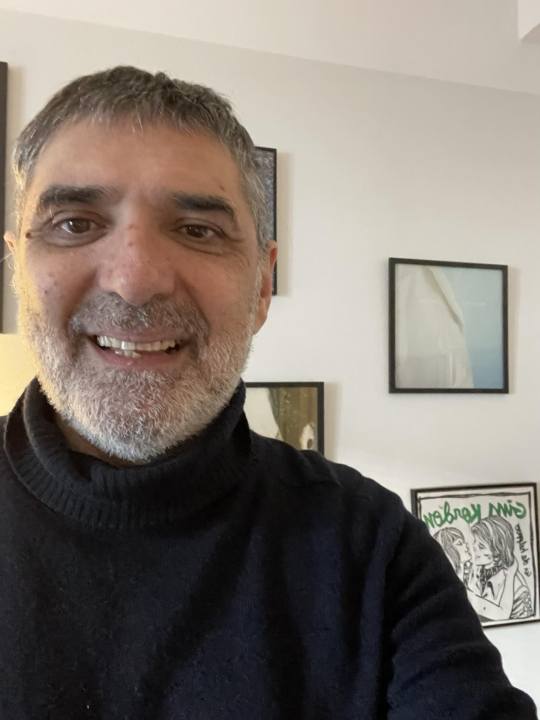
SOLITI 2023: THE END OF YEAR LISTS
Triani from Soliti
The Good Times
Lovely Soliti releases from Ghosts on TV, Juppe, Stinako and Knife Girl.
Old Music
Ennio Morricone – Quando l’amore e Sensualita
Beach Boys – Friends
George Michael – Older
Felt discography
The Songs of Bacharach and Costello was on constant rotation (my fave reissue of the year.)
Teardrop Explodes – Culture Bunker box set
Lana Del Ray – Norman Fucking Rockwell
Rip Rig & Panic – I Am Cold
Plush – More You Becomes You
Neil Young – Chrome Dreams
Stevie Wonder – Fulfilling His First Finale
Joan Baez – Blessed Are
Paul Weller – 22 dreams
Sault discography
Velvet Underground – Loaded
Thelonious Monk – Straight, No Chaser
Arthur Russell – Picture of Bunny Rabbit
David Sylvian discography
New Music
I didn’t think this year offered much until I put this list together.
It’s been quietly fabulous.
Lana Del Ray – Did you know that there’s a tunnel under Ocean Blvd
Kara Jackson – Why Does The Earth Give Us People To Love?
Robert Forster – The Candle And The Flame
SAZ – SOS
Feist – Multitudes
King Krule – Space Heavy
Christine and the Queens – PARANOÏA, ANGELS, TRUE LOVE
Overmono – Good Lies
Ryuichi Sakamoto – 12
The Lemon Twigs – Everything Harmony
John Cale – Mercy
Bar Italia – Tracey Denim
Sufjan Steven – Javelin
Wilco – Cousin
Sparklehorse – Bird Machine
Amanda Brown – Eight Guitars
Durand Jones – Wait Til I Get Over
Lil Yachty – Let’s Start Here.
Beach Fossils – Bunny
ANHONI – My Back Was a Bridge For You To Cross
Lankum – False Lankum
Mitski – The Land Is Inhospitable and So Are We
El Michels Affair & Black Thought – Glorious Game
Best tracks
Everything But The Girl – Nothing Left To Lose
Dexys – My Submission
Lana Del Rey – A&W
Devendra Banhart – Sirens
Kara Jackson – no fun/party
Knife Girl – Estrogen
Felt – Primitive Painters
TV, films books
The Bear (TV series)
The Last of Us (TV series)
Mrs Davis (TV Series)
The Last Movie Stars (TV Series)
Welcome to Wrexham (TV Series)
Dirty Harry movie box set (all five movies)
Richard Jewell (Film)
Crimes oF The Future (Film)
Barbie vs Oppenheimer (loved both of these)
The Exorcist (Film)
Love to Love You, Donna Summer (documentary)
Quentin Tarantino – Cinema Speculation (Book)
Dylan Jones – Loaded: The Life (and Afterlife) of the Velvet Underground (Book)
Alan Moore/Jacen Burrows – Neonomicon (Book)
Collected Judge Dredd (Books)
Sight & Sound (magazine)
The Guardian (online)
The Quietus (online)
This is a good thing
My family and home life. It’s still my favourite place to be.
Football in all its gross financial injustices, still remains a truly entertaining, all welcoming spectacle – a break from our realities. I spent a lot of my days obsessed with the beautiful game.
My own team Tottenham’s reimagining as a team for the neutral under Ange Postecoglou.
I’ve had a serious post-covid hangover about going out; crowds and especially going to concerts.
But still this year I managed to catch a few shows. John Cale and Knife Girl at the Helsinki Festival was very special.
Elvis Costello at Kulttuuritalo was a great way to spend an evening – I didn’t really want it to end (and this was also a rare date with my partner!) Emma Ruth Rundle, Sorry, Jake Xerxes Fussell were good festival experiences.
I’m an eternal optimist with dreams that we can all get along, people can be who they wanna be and somehow humanity pulls together to save the planet. My dream state staves off the dark feelings that are increasingly hard to ignore.
This is a low
The Israel demolition of Palestine in response to Hamas atrocities is a key world happening which will resonate for decades to come.
British Conservatives and all right wing ideologues who – in collusion with the mainstream media – spend most of their time demonising refugees and the trans community.
The public discussion around minorities in Finland is base and inhumane. This right-wing Finnish government has been a hard dose of reality that has sprung many of us out of our comfort zones. The casual racism of the Finnish government has normalised terminology that should offend everyone. Disgraceful.
The lack of a moral compass or compassion in world politics – who exactly are the good guys?
I hope someone could point out who’s looking out for us all nowadays?
Elon Musk and the destabilising of Twitter. He just couldn’t leave it alone could he?
The unstoppable rise of AI. It’s a slow process (or maybe a fast one) that results in the death of a certain kind of creativity. Hearing that some people in the Music business are using AI to write press releases is a little sad.
The Saudi exploitation of football. It doesn’t stop. How long till the whole of football is owned by Saudi Arabia?
The Vinyl market becoming an expensive artefact for the wealthy. In typical Music Industry fashion, the vinyl format becomes revitalised only for the music industry to make the price prohibitive for most people. Own goals are rarely clearer.
Future
To be a better me.
Happy holidays x
4 notes
·
View notes
Text
By: Rob Henderson
Published: Feb 23, 2024
Born in Los Angeles into what many would consider the American lower class, I entered the foster system aged three after my drug-addicted birth mother, originally from Seoul, was unable to care for me. Over the next five years, I moved through seven different foster homes. I grew up without knowing my father, only discovering his Hispanic heritage, with roots in Mexico and Spain, through a genetic test last year.
When I was seven, I was adopted by a working-class family and subsequently settled in a dusty town called Red Bluff, California, in one of the poorest counties in the state. My adoptive parents divorced shortly thereafter, and my adolescence was marked by substance abuse, violence, family tragedy and financial catastrophe. I fled as soon as I could at 17, enlisting in the US air force right after high school. Eventually, after several missteps, I managed to gain admission to one of the most prestigious universities in the world.
I came to Yale to major in psychology, but my curiosity soon overflowed the boundaries of my degree. In my attempt to understand class distinctions, I spent a lot of time thinking and reading about class divides and social hierarchies, and compared what I’d learnt with my experiences on campus. Gradually, I developed the concept of “luxury beliefs”, which are ideas and opinions that confer status on the upper class at very little cost, while often inflicting costs on the lower classes.
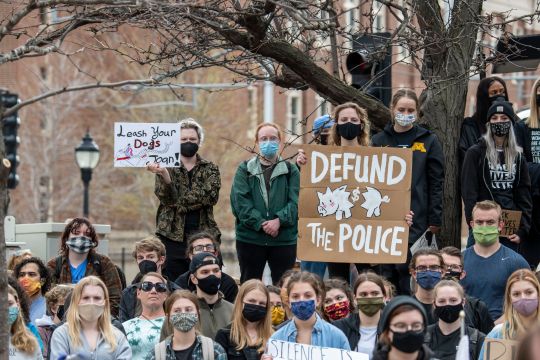
[ The richest Americans showed the strongest support for defunding the police ]
The upper class includes (but is not necessarily limited to) anyone who attends or graduates from an elite university and has at least one parent who is a university graduate. Research has found that parental educational attainment is the most important objective indicator of social class. Compared with parental income, parental education is a more powerful predictor of a child’s future lifestyle, tastes and opinions.
It is a vexed question whether first-generation graduates can truly enter the upper class. Paul Fussell, the social critic and author of Class, wrote that manners, tastes, opinions and conversational style are just as important for upper-class membership as money or credentials, and that to fulfil these requirements, you have to be immersed in affluence from birth. Likewise, the French sociologist Pierre Bourdieu stated that a “triadic structure” of schooling, language and taste was necessary to be accepted among the upper class. Bourdieu described the mastery of this triad as “ease”. When you grow up in a social class, you come to embody it. You represent its tastes and values so deeply that you exhibit ease within it.
People with parents who are university graduates are often better equipped to gain and maintain status — they tend to be more adept at navigating organisations, smoothly interacting with colleagues and positioning themselves for advancement. Consistent with this, in 2021 the Pew Research Center found that among US households headed by a graduate, the median wealth of those who had a parent with at least a bachelor’s degree was nearly $100,000 greater than those who don’t have college-educated parents.
This bonus of being a “continuing-generation” (as opposed to a “first-generation”) college graduate has been termed the “parent premium”. I don’t have the parent premium. For extended periods of my youth, I had the opposite. It’s impossible to say that every individual in a particular class or category has the exact same features across the board. Still, graduates of elite universities generally occupy the top quintile of income, often wield outsized social influence and are disproportionately likely to hold luxury beliefs that undermine social mobility.
For example, a former classmate at Yale told me “monogamy is kind of outdated” and not good for society. I asked her about her background and if she planned to marry. She was raised in a stable two-parent family, just like the vast majority of our classmates. And she planned on getting married herself. But she insisted that traditional families are old-fashioned and that society should “evolve” beyond them.
My classmate’s promotion of one ideal (“monogamy is outdated”) while living by another (“I plan to get married”) was echoed by other students in different ways. Some would, for instance, tell me about the admiration they had for the military, or how trade schools were just as respectable as college, or how college was not necessary to be successful. But when I asked them if they would encourage their own children to enlist or become a plumber or an electrician rather than apply to college, they would demur or change the subject.
Later, I would connect my observations to stories I read about tech tycoons, another affluent group, who encourage people to use addictive devices while simultaneously enforcing rigid rules at home about technology use. For example, Steve Jobs prohibited his children from using iPads. Parents in Silicon Valley reportedly tell their nannies to closely monitor how much their children use their smartphones. Don’t get high on your own supply, I guess. Many affluent people now promote lifestyles that are harmful to the less fortunate. Meanwhile, they are not only insulated from the fallout; they often profit from it.
In the past, people displayed their membership of the upper class with their material accoutrements. But today, luxury goods are more accessible than before. This is a problem for the affluent, who still want to broadcast their high social position. But they have come up with a clever solution. The affluent have decoupled social status from goods and reattached it to beliefs.
Human beings become more preoccupied with social status once our physical needs are met. Research has shown that sociometric status (respect and admiration from peers) is more important for wellbeing than socioeconomic status. Furthermore, studies have described how negative social judgment is associated with a spike in cortisol (a hormone linked to stress) that is three times higher than in non-social stressful situations. We feel pressure to build and maintain social status, and fear losing it.
It seems reasonable to think that the most downtrodden might be most interested in obtaining status and money, but this is not the case. Denizens of prestigious institutions are even more interested than others in prestige and wealth. For many of them, that drive is how they reached their lofty positions in the first place. They persistently look for new ways to move upward and avoid moving downward.
The French sociologist Émile Durkheim understood this when he wrote: “The more one has, the more one wants, since satisfactions received only stimulate instead of filling needs”. And research supports this. A psychology study in 2020 revealed that “Upper-class individuals cared more about status and valued it more highly than working-class individuals … Furthermore, compared with lower-status individuals, high-status individuals were more likely to engage in behaviour aimed at protecting or enhancing their status.” Plainly, high-status people desire status more than anyone else does.
You might think that, for example, rich students at elite universities would be happy because their parents are in the top 1 per cent of income earners, and that statistically they will soon join their parents in this elite guild. But remember, they’re surrounded by other members of the 1 per cent. For many elite university students, their social circle consists of baby millionaires, which often instils a sense of insecurity and an anxiety to preserve and maintain their positions against such rarefied competitors.
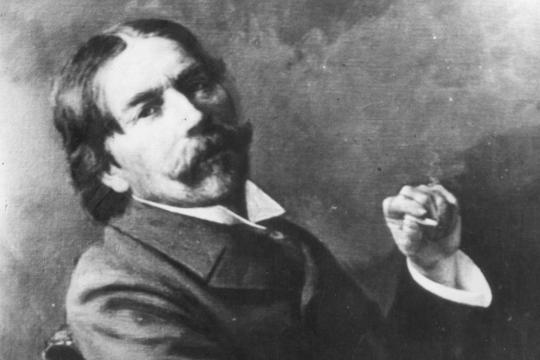
[ The US sociologist Thorstein Veblen said the wealthy flaunt status symbols because only they could afford them ]
Thorstein Veblen’s famous “leisure class” has evolved into the “luxury belief class”. Veblen, an economist and sociologist, compiled his observations about social class in his classic 1899 book The Theory of the Leisure Class. A key idea is that because we can’t be certain of the financial standing of other people, a good way to size up their means is to see whether they can afford to waste money on goods and leisure. This explains why status symbols are so often difficult to obtain and costly to purchase.
In Veblen’s day, people exhibited their status with delicate and restrictive clothing such as tuxedos, top hats and evening gowns, or by partaking in time-consuming activities like golf or beagling. Veblen suggested that the wealthy flaunt these symbols not because they are useful but because they are so pricey or wasteful that only the wealthy can afford them, which is why they are high-status indicators.
During my first year at Yale in 2015, it was common to see students at Ivy League colleges wearing Canada Goose jackets. Is it necessary to spend $900 to stay warm in New England? No. But kids weren’t spending their parents’ money just for the warmth. They were spending the equivalent of the typical American’s weekly income ($865) for the logo. Likewise, are students spending $250,000 at prestigious American universities for the education? Maybe. But they are also spending it for the logo.
As the New York University professor Scott Galloway said in an interview in 2020: “The strongest brand in the world is not Apple or Mercedes-Benz or Coca-Cola. The strongest brands are MIT, Oxford, and Stanford. Academics and administrators at the top universities have decided over the last 30 years that we’re no longer public servants; we’re luxury goods.”
This is not to say that elite colleges don’t educate their students, or that Canada Goose jackets don’t keep their wearers warm. But top universities are also crucial for induction into the luxury belief class. Take vocabulary. Your typical working-class American could not tell you what “heteronormative” or “cisgender” means. But if you visit an elite university, you’ll find plenty of affluent people who will eagerly explain them to you. When someone uses the phrase cultural appropriation, what they are really saying is, “I was educated at a top college”. Only the affluent can afford to learn strange vocabulary, because ordinary people have real problems to worry about.
White privilege is the luxury belief that took me the longest to understand, because I grew up around a lot of poor white people. Affluent white college graduates seem to be the most enthusiastic about the idea of white privilege, yet they are the least likely to incur any costs for promoting that belief. Rather, they raise their social standing by talking about their privilege. When policies are implemented to combat white privilege, it won’t be Yale graduates who are harmed. Poor white people will bear the brunt.
The upper class promotes abolishing the police or decriminalising drugs or white privilege because it advances their social standing. The logic is akin to conspicuous consumption: if you’re a student who has a large subsidy from your parents and I do not, you can afford to waste $900 and I can’t, so wearing a Canada Goose jacket is a good way of advertising your superior wealth and status. Proposing policies that will cost you as a member of the upper class less than they would cost me serves the same function. Advocating for sexual promiscuity, drug experimentation or abolishing the police are good ways of advertising your membership of the elite because, thanks to your wealth and social connections, they will cost you less than me.
A well-heeled student at an elite university can experiment with cocaine and will, in all likelihood, be fine. A kid from a dysfunctional home with absentee parents will often take that first hit of meth to self-destruction. This is perhaps why a 2019 survey found that less than half of Americans without a college degree want to legalise drugs, but more than 60 per cent of Americans with a bachelor’s degree or higher are in favour of drug legalisation.
Similarly, a 2020 survey found that the richest Americans showed the strongest support for defunding the police, while the poorest reported the lowest support. Throughout the remainder of that year and into 2021, murder rates throughout the US soared as a result of defunding policies, officers retiring early or quitting, and police departments struggling to recruit new members after the luxury belief class cultivated an environment of loathing toward law enforcement.
Consider that compared with Americans who earn more than $75,000 a year, the poorest Americans are seven times more likely to be victims of robbery, seven times more likely to be victims of aggravated assault and 20 times more likely to be victims of sexual assault. And yet many affluent people are calling to abolish law enforcement.
Most personal to me is the luxury belief that family is unimportant or that children are equally likely to thrive in all family structures. In 1960, the percentage of American children living with both biological parents was identical for affluent and working-class families — 95 per cent. By 2005, 85 per cent of affluent families were still intact, but for working-class families the figure had plummeted to 30 per cent. The Harvard political scientist Robert Putnam said at a 2017 Senate hearing: “Rich kids and poor kids now grow up in separate Americas … Growing up with two parents is now unusual in the working class, while two-parent families are normal and becoming more common among the upper middle class.”
Affluent people, particularly in the 1960s, championed sexual freedom. Loose sexual norms caught on for the rest of society. The upper class, though, still had intact families. Generally speaking, they experimented in college and then settled down. The families of the lower classes fell apart.
This deterioration is still happening. In 2006, more than half of American adults without a university degree believed it was “very important” that couples with children should be married. Fast-forward to 2020, and this number has plummeted to 31 per cent. Among university graduates, only 25 per cent think couples should be married before having kids. Their actions, though, contradict their luxury beliefs: the vast majority of American university graduates who have children are married. And yet, despite their behaviour suggesting otherwise, affluent people are the most likely to say marriage is unimportant.
Troubled: A Memoir of Foster Care, Family, and Social Class by Rob Henderson is published by Forum
#Rob Henderson#luxury beliefs#luxury goods#defund the police#elite class#status seeking#religion is a mental illness
4 notes
·
View notes